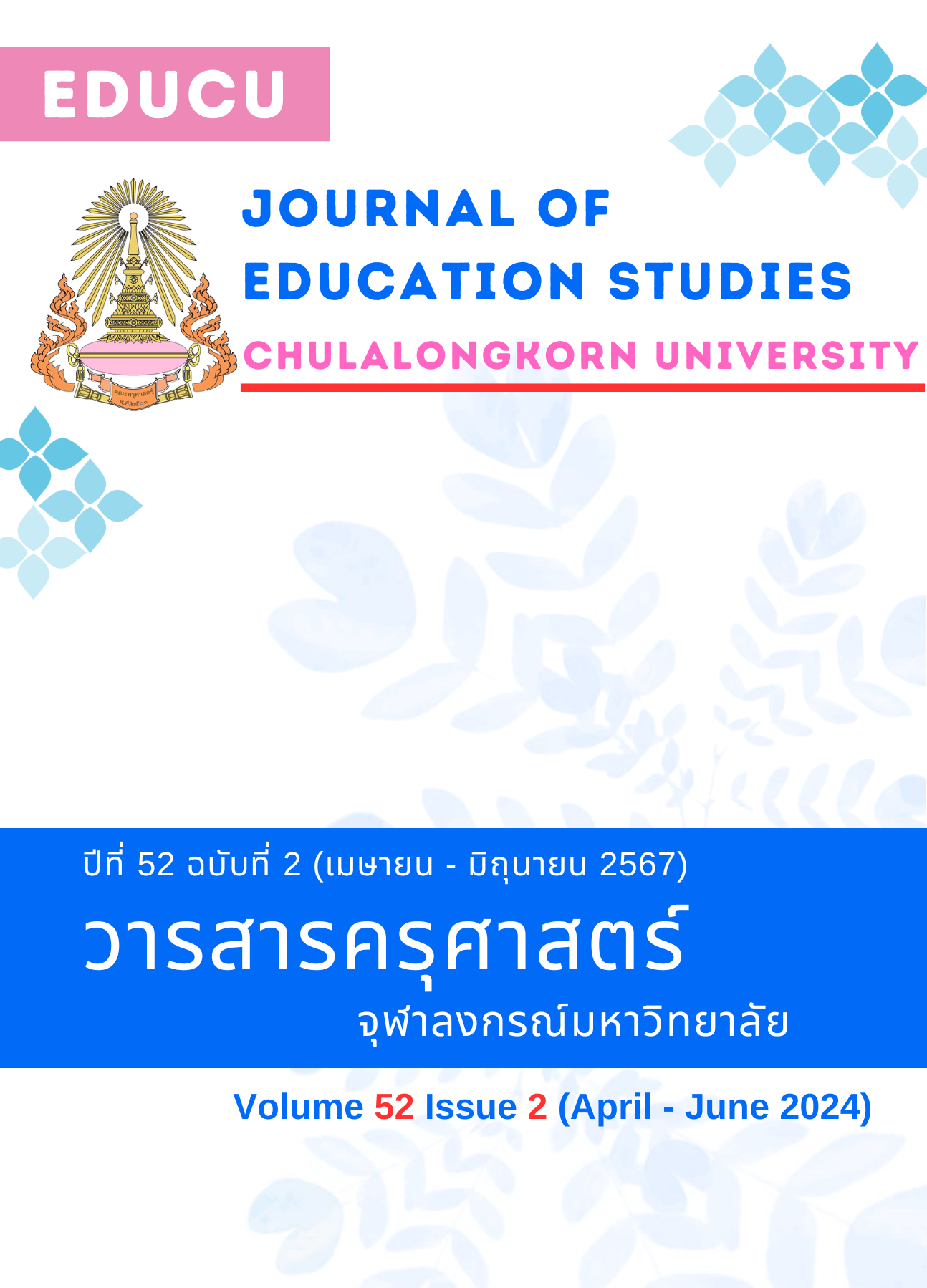A Comparative Study of the Professional Competency Framework for Music Teachers in Thailand and the European Union
DOI:
https://doi.org/10.14456/educu.2024.26Keywords:
comparative study, music teacher competencies in Thailand, music teacher competencies in the European UnionAbstract
The study of music teacher competency is a study of music teachers' ability to integrate knowledge and skills in teaching and music, including appropriate behavior as a guideline for music teachers in their own work and professional development. The purpose of this research is to compare the competencies of music teachers in Thailand and the European Union by means of document research, comparing data between the Teachers Council regulations on professional standards and the announcement of the Ministry of Education on the standard framework for bachelor's degree qualifications in the field of education and music education, and Report on the education of music teachers from the perspective of the European Union. The results of the study show that the music teacher competency frameworks of Thailand and the European Union, although they have different focuses and presentation methods according to the context of application in each country, are consistent in their key principles. The competencies of music teachers can be classified into 6 areas, consisting of 1) music knowledge and skills, 2) teaching and learning management, 3) communication and technology, 4) teaching and learning research, 5) relationships with individuals and communities and 6) ethics and conduct. Studying the competency framework for music teachers will be beneficial to the process of improving the production and development of music teachers in Thailand to be modern and consistent with the needs and changes in the social context.
References
ภาษาไทย
ข้อบังคับคุรุสภา ว่าด้วยจรรยาบรรณของวิชาชีพ พ.ศ. 2556. (2556, 4 ตุลาคม). ราชกิจจานุเบกษา. เล่ม 130 ตอนพิเศษที่ 130. หน้า 73-74.
ข้อบังคับคุรุสภา ว่าด้วยมาตรฐานวิชาชีพ (ฉบับที่ 4) พ.ศ. 2562. (2562, 20 มีนาคม). ราชกิจจานุเบกษา. เล่ม 136 ตอนพิเศษที่ 68. หน้า 18-19.
ฉัตรชัย หวังมีจงมี. (2560). สมรรถนะของครูไทยในศตวรรษที่ 21 : ปรับการเรียน เปลี่ยนสมรรถนะ. วารสาร HRIntelligence, 12(2), 47-63.
ประกาศกระทรวงศึกษาธิการ. (2554). มาตรฐานคุณวุฒิระดับปริญญาตรี สาขาครุศาสตร์และสาขาศึกษาศาสตร์ (หลักสูตรห้าปี). กระทรวงศึกษาธิการ.
ประกาศกระทรวงศึกษาธิการ. (2562). มาตรฐานคุณวุฒิระดับปริญญาตรี สาขาครุศาสตร์และสาขาศึกษาศาสตร์ (หลักสูตรสี่ปี) พ.ศ. 2562. กระทรวงศึกษาธิการ.
ปวันรัตน์ ประศาสน์ศิลป์ และ พระราชรัตนมงคล. (2563). ตัวบ่งชี้คุณสมบัติของครูดนตรี ในระดับมัธยมศึกษาสังกัดสำนักงานคณะกรรมการการศึกษาขั้นพื้นฐาน. วารสาร มจร บาฬีศึกษาพุทธโฆสปริทรรศน์, 6(2), 42-54.
พระราชบัญญัติการศึกษาแห่งชาติ พ.ศ. 2542. (2542, 14 สิงหาคม). ราชกิจจานุเบกษา. เล่ม 116 ตอนที่ 74. หน้า 8.
ณัฐวัฒน์ โฆษิตดิษยนันท์, เฉลิมชัย เจริญเกียรติกานต์, และ ชัษษพณขิ์ จันวงค์เดือน. (2566). การศึกษาสมรรถนะด้านการจัดการเรียนรู้เชิงรุกของครูดนตรี ที่สำเร็จการศึกษาจากมหาวิทยาลัยราชภัฏ. วารสารครุทรรศน์, 3(2), 93-104.
ณรุทธ์ สุทธจิตต์. (2561). ดนตรีศึกษา หลักการและสาระสำคัญ (พิมพ์ครั้งที่ 10). สำนักพิมพ์จุฬาลงกรณ์มหาวิทยาลัย.
สำนักงานเลขาธิการคุรุสภา. (2562). กรอบสมรรถนะครูเอเชียตะวันออกเฉียงใต้. กรุงเทพมหานคร. บริษัท ออนป้า จำกัด.
อาทิตย์ โพธิ์ศรีทอง, รจนา คลี่ฉายา, และ ประพันธ์ศิริ สุเสารัจ. (2559). การพัฒนาหลักสูตรฝึกอบรมครู เพื่อส่งเสริมสมรรถนะการจัดการเรียนรู้ทางด้านดนตรี ในศตวรรษที่ 21. วารสารสถาบันวัฒนธรรมและศิลปะ มหาวิทยาลัยศรีนครินทรวิโรฒ, 17(2), 37-48.
ภาษาอังกฤษ
Association Européenne des Conservatoires (AEC). (2010). Instrumental and vocal teacher education: European perspectives. Utrecht: European Association of Conservatoires. Access online: https://www.aec-music.eu/userfiles/File/aec-handbook-instrumental-vocal-teacher-education-european-perspectives-en.pdf
Bereday, G. Z. F. (1964). Comparative method in education. New York: Holt, Rinehart, and Winston, Inc.
Davidson, J. W., Moore, D. G., Sloboda, J. A., & Howe, M. J. A. (1998). Characteristics of Music Teachers and the Progress of Young Instrumentalists. Journal of Research in Music Education, 46(1), 141–160. https://doi.org/10.2307/3345766
Davidova, J. (2019). Music Teacher’s Competences in the 21st Century. Pedagogika, 134(2), 99-108, https://doi.org/10.15823/p.2019.134.6
Klingenstein, B. G. (2009). The Independent Piano Teacher’s Studio Handbook: Everything You Need to Know for a Successful Teaching Studio. Milwaukee: Hal Leonard Corporation.
Kos, R. P. (2018). Policy and the K–12 Music Teacher: A Literature Review. Update: Applications of Research in Music Education, 37(1), 20-29. https://doi.org/10.1177/8755123318758837
Le Deist, F. D., & Winterton, J. (2005). What Is Competence? Human Resource Development International, 8(1), 27-46. http://doi.org/10.1080/1367886042000338227
Nessipbayeva, O. (2012). The Competencies of the Modern Teacher. Bulgarian Comparative Education Society. 148-154. Retrieved from https://eric.ed.gov/?id=ED567059
Odunuga, F. A., & Udok, C. E. (2016). Developing Professional Competencies in the 21st Century Music Teachers. Journal of Teaching and Education, 5(1), 699–706.
Roa, M. J. A., & Luzano, A. R. (2023). Competencies and Challenges in Teaching Music. International Journal of Research Publications, 123(1), 11-22. DOI: 10.47119/IJRP1001231420234682
Sabirovna, R. S. (2022). Problems of increasing professional competence in shaping music teachers. International journal of Social Sciences & Interdisciplinary Research, 11(3), 84-89.
Spencer, L. M., & Spencer, S. M. (1993). Competence at work: Models for superior performance. Wiley.

Downloads
Published
How to Cite
Issue
Section
License

This work is licensed under a Creative Commons Attribution-NonCommercial-NoDerivatives 4.0 International License.



